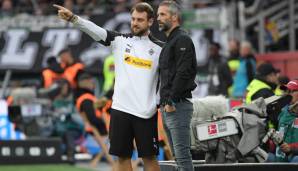You have a degree in psychology. To what extent is that necessary on a coaching team, and how important is this aspect when dealing with individual players?
Maric: It's very important, because interaction is more important than methodology or expertise. Without good relationships, nothing is conveyed successfully, even if you're potentially full of lots of information. In that respect, the presence of a psychologist within a coaching team makes sense. The most important thing, however, is that when pursuing a collective goal, everyone is aware of their responsibility in terms of their interaction with other people from the staff, the team, or the club - only that leads to success.
When speaking to people who know you well, most will praise your social competence. Is this something a person simply has or is it another benefit from university?
Maric: I dare say outsiders will find this easier to assess. I too have my quirks, idiosyncrasies, and moments during which I'm not quite as easy to get along with. Apart from that, I'm a relatively straightforward person. I'm usually in a good mood, thankful for my job, and eager to make the most of it. The psychologist Carl Rogers once named authenticity, congruency, appreciation, and empathy as important tenets. I try to be guided mostly by that.
Last winter, you said on Twitter that you had learned a lot at Borussia Mönchengladbach but that you were also 'still making a lot of mistakes'. Could you elaborate a little?
Maric: There are so many details here, we simply don't have time for me to list everything. In Frank Geideck and Philipp Schützendorf, for example, we have an assistant manager and a video analyst who have been with Borussia for a very long time and are extremely competent. In talking to them, you're picking out facets, perspectives, and ideas that can help you develop. In the beginning, my most severe mistakes were being impatient with Marco or even encroaching on his territory, sometimes due to my nativity. It starts with the manner of discussions within the coaching team, continues with the way you interact with the media, and ends with your own readiness to admit mistakes.
Due to the experience you've gained so far on a professional level, do you know view some football-specific subjects in a simpler and more practice-related way than before?
Maric: Yes. If the consequences of your own work are not only more visible but also more tangible, you develop a better sense for the importance of details. The basics always have to add up, because they occur in almost every situation. Often, the creation and snapping shut of pressing traps, for instance, can only occur two or three times in a match - well-reproduced philosophies, on the other hand, can do so almost continuously. Simply put, football is a players' game. Players constantly make decisions at the highest speed. This means that, as mentioned previously, preset routines are only possible very occasionally. I also try to think differently now: not from the team to the individual player or from the idea to the process downwards, but rather the opposite - from the individual player or a playing situation upwards. A team always consists of individuals; a situation always consists of players with ideas, not of numerical relationships.
And yet, football also seems to have a hold on you even in your spare time. You spent your winter break in Ethiopia with Patrick Eibenberger, head of Gladbach's head of athletics, giving lectures. Tell us about that.
Maric: My friend Addis Worku works in the First Division over there. Years ago, he just messaged me to chat about football. I replied out of curiosity, and we've been in contact ever since. He even came to watch two of our games in Salzburg. Not only is he an expert but also a good-hearted, great guy. In that respect, the trip was primarily a visit to see a mate and to see a bit of his country. In addition, we held a free course, organised by Addis and targeted at the local coaches of the first and second divisions, since it is Addis' personal wish to improve Ethiopian football. Patrick and I did two half days of lectures. His subjects were athletics and weight bearing control, mine were essentially football theory and practice.
Finally: just how proud are you of everything you've accomplished so far, and can you imagine returning to the post of head coach?
Maric: I am very proud. More than pride, though, I feel gratitude: it is not a given for either Marco Rose, Christoph Freund or Ernst Tanner at Salzburg, and now Max Eberl at Borussia Mönchengladbach, to give a chance and their trust to such a young outsider. A return to the head coach post is fundamentally conceivable, but I don't yet know where I would go. I'm currently doing my A licence. Should I be successful, I would then just need my Pro licence. I need to gain much more experience. I realise that there is still a lot I can learn, and I think that I can do so from Marco in particular. I'm only really thinking about the present.





